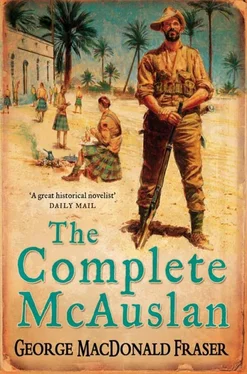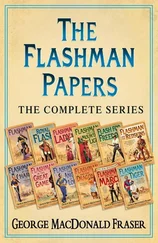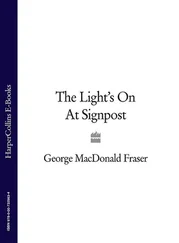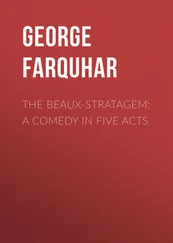So when I walked into the guard room for a late night look round and saw one of the cell doors closed and padlocked, and a noise issuing from behind it like the honking of a drowsy seal, I asked McGarry, the provost sergeant, who his guest for the night might be.
“It’s yon animal, Wee Wullie,” he said. “Sharrap, ye Glasgow heathen! He’s gey fu’ sir, an’ half-killed a redcap in the toon. They had to bring him here in a truck wi’ his hands tied and a man sittin’ on his heid. And afore I could get him in there I had to restrain him, mysel’.”
I realised that McGarry had a swelling bruise on one cheek and that his usually immaculate khaki shirt was crumpled; he was a big man, with forearms like a blacksmith, and the skin on his knuckles was broken. I was glad it wasn’t me he had had to restrain.
“He’s sleepin’ like a bairn noo, though,” he added, and he said it almost affectionately.
I looked through the grill of the cell. Wee Wullie was lying on the plank, snoring like an organ. Between his massively booted feet at one end, and the bonnet on his grizzled head at the other, there was about six and a half feet of muscular development that would have done credit to a mountain gorilla. One of his puttees was gone, his shirt was in rags, and there was a tear in his kilt; his face, which at the best of times was rugged, looked as though it had been freshly trampled on. On the palm of one outstretched hand still lay a trophy of his evening’s entertainment—a Military Police cap badge. In that enormous brown paw it looked about as big as a sixpence.
“You did well to get him inside,” I told McGarry.
“Ach, he’s no’ bad tae manage when he’s puggled,” said the provost. “A big, coorse loon, but the booze slows him doon.”
I had some idea of what McGarry called “no’ bad tae managed”. I recalled Hogmanay, when Wee Wullie had returned from some slight jollification in the Arab quarter having whetted his appetite for battle on the local hostelries, and erupted through the main gate intent on slaughter. It had been at that moment of the day which, for a soldier, is memorable above all others; the hour when the Last Post is sounded, and everything else is still while the notes float sadly away into the velvet dark; the guard stand stiffly to attention by the main gate with the orderly officer behind, and the guard room lanterns light up the odd little ceremony that has hardly changed in essentials since the Crimea. It is the end of the Army’s day, peaceful and rather beautiful.
Into this idyll had surged Wee Wullie, staggering drunk and bawling for McGarry to come out and fight. For a moment his voice had almost drowned the bugle, and then (because he was Wee Wullie with 30 years’ service behind him) he had slowly come to attention and waited, swaying like an oak in a storm, until the call was ended. As the last note died away he hurled aside his bonnet, reeled to the foot of the guard room steps, and roared:
“Coom oot, McGarry! Ah’m claimin’ ye! Ye’ve had it, ye big Hielan’ stirk! Ye neep! Ye teuchter, ye!”
McGarry came slowly out of the guard room, nipping his cigarette, and calmly regarded the Neanderthal figure waiting for him. It looked only a matter of time before Wee Wullie started drumming on his chest and pulling down twigs to eat, but McGarry simply said,
“Aye, Wullie, ye’re here again. Ye comin’ quiet, boy?”
Wullie’s reply was an inarticulate bellow and a furious fist-swinging charge, and five minutes later McGarry was kneeling over his prostrate form, patting his battered face, and summoning the guard to carry the body inside. They heaved the stricken giant up, and he came to himself just as they were manhandling him into the cooler. His bloodshot eyes rolled horribly and settled on McGarry, and he let out a great cry of baffled rage.
“Let me at ’im! Ah want at ’im!” He struggled furiously, and the four men of the guard clung to his limbs and wrestled him into the cell.
“Wheesht, Wullie,” said McGarry, locking the door. “Just you lie doon like a good lad. Ye’ll never learn; ye cannie fight McGarry when ye’re fu’. Now just wheesht, or I’ll come in tae ye.”
“You!” yelled Wullie through the bars. “Oh, see you! Your mither’s a Tory!”
McGarry laughed and left him to batter at the door until he was tired. It had become almost a ritual with the two of them, which would be concluded when Wullie had sobered up and told McGarry he was sorry. It was Wullie’s enduring problem that he liked McGarry, and would fight with him only when inflamed by drink; yet drunk, he could not hope to beat him as he would have done sober.
I thought of these things as I looked into the cell at Wee Wullie asleep. On that wild Hogmanay I should, of course, have used my authority to reprimand and restrain him, and so prevented the unseemly brawl with the provost sergeant, but you don’t reprimand a rogue elephant or a snapped wire hawser, either of which would be as open to sweet reason as Wee Wullie with a bucket in him. The fact that he would have been overwhelmed by remorse afterwards for plastering me all over the guard room wall would not really have been much consolation to either of us. So I had remained tactfully in the background while Sergeant McGarry had fulfilled his regimental duty of preserving order and repressing turbulence.
And now it had happened again, for the umpteenth time, but this time it was bad. From what McGarry had told me, Wee Wullie had laid violent hands on a military policeman, which meant that he might well be court-martialled—which, inevitably, for a man with a record like his, would mean a long stretch in the glasshouse at Cairo.
“He’ll no’ get away wi’ it this time, poor loon,” said McGarry. “It’ll be outwith the battalion, ye see. Aye, auld Wullie, he’ll be the forgotten man of Heliopolis nick if the redcaps get their way.” He added, apparently irrelevantly, “For a’ the Colonel can say.”
I left the guard room and walked across the starlit parade ground through the grove of tamarisks to the white-walled subalterns’ quarters, wondering if this was really the finish of Wee Wullie. If it was, well, the obvious thing to do would be to thank God we were rid of a knave, an even bigger battalion pest than the famous Private McAuslan, the dirtiest soldier in the world, an Ishmael, a menace, a horrible man. At the same time …
All that was really wrong with Wee Wullie was his predilection for strong drink and violent trouble. He was drunk the first time I ever saw him, on a desert convoy passing under Marble Arch, that towering monument to Mussolini’s vanity which bestrides the road on the Libyan border. I had noticed this huge man, first for his very size, secondly for his resemblance to the late William Bendix, and lastly for his condition, which was scandalous. He was patently tight, but still at the good-humoured stage, and was being helped aboard a truck by half a dozen well-wishers. They dropped him several times, and he lay in the sand roaring. I was a green subaltern, but just experienced enough to know when not to intervene, so I left them to it, and eventually they got him over the tailboard. (It is astonishing just how often an officer’s duty seems to consist of looking the other way, or maybe I was just a bad officer.)
In the battalion itself he was a curious mixture. As far as the small change of soldiering went, Wullie was reasonably efficient. His kit at inspections was faultless, his knowledge and deportment exact, so far as they went, which was just far enough for competence. In his early days he had been as high as sergeant before being busted (I once asked the Adjutant when this had been, and he said, “God knows, about the first Afghan War, I should think”), but in later years the authorities had despaired of promoting him to any rank consistent with his length of service. Occasionally they would make him a lance-corporal, just for variety, and then Wullie would pick a fight with the American Marines, or tip a truck over, or fall in alcoholic stupor into a river and have to be rescued, and off would come his stripe again. He had actual service chevrons literally as long as his arm, but badges of rank and good conduct he had none.
Читать дальше












